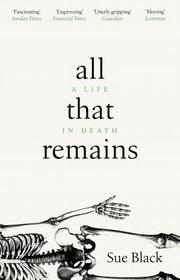Fascinating, heartbreaking and hilarious in equal measure, and not quite what I was expecting.
If you are hoping for a CSI-style "strange murder of the week" anthology, you may be sorely disappointed, because the subtitle is the give-away here: Professor Black has structured her overview of the art and science of forensic anthropology by answering the (impertinent) question, "how did a nice girl like you get into a job like this?" We learn about her family, pre- and post-mortem, her first job in a butcher shop, her college and medical school education, and her subsequent career. For each stage of her life she finds examples of how she first confronted death, or learned to cope with it, or developed the skills and mind set that allow her to do her job with the utmost professionalism and respect for the deceased and the loved ones they leave behind.
And, for me, it worked. It probably helps that I have become very tired with the "murder as entertainment" genre: Black never avoids or denies that death can come with a hearty helping of black humor, and that those who deal with it on a daily basis can use humor to keep their sanity. But every example she uses, however strange or however useful it is to illustrate her teaching points, is built on the foundations that this is someone's tragedy, and must be considered with respect.
If you are hoping for a CSI-style "strange murder of the week" anthology, you may be sorely disappointed, because the subtitle is the give-away here: Professor Black has structured her overview of the art and science of forensic anthropology by answering the (impertinent) question, "how did a nice girl like you get into a job like this?" We learn about her family, pre- and post-mortem, her first job in a butcher shop, her college and medical school education, and her subsequent career. For each stage of her life she finds examples of how she first confronted death, or learned to cope with it, or developed the skills and mind set that allow her to do her job with the utmost professionalism and respect for the deceased and the loved ones they leave behind.
And, for me, it worked. It probably helps that I have become very tired with the "murder as entertainment" genre: Black never avoids or denies that death can come with a hearty helping of black humor, and that those who deal with it on a daily basis can use humor to keep their sanity. But every example she uses, however strange or however useful it is to illustrate her teaching points, is built on the foundations that this is someone's tragedy, and must be considered with respect.




